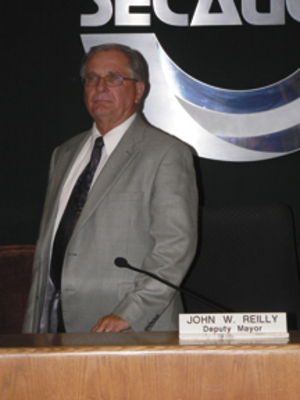What a difference a resignation can make.
Particularly if it’s the resignation of a powerful mayor whose faction of the Town Council held a one-vote majority.
Hours after the resignation of former Mayor Dennis Elwell, who was arrested July 23 on corruption charges, the Town Council held its first session without him at the helm as meeting chairman. Deputy Mayor and 3rd Ward Town Councilman John Reilly is currently acting mayor and chaired the meeting in Elwell’s place.
Dozens of media outlets – from television, print, the web, and radio – flooded the council chambers and overflowed into the hallway outside.
But they ended up seeing, of all things, cooperation.
With the often contentious dynamic between Elwell and Councilman and mayoral candidate Michael Gonnelli absent from the session, the governing body held a meeting that was free of the sniping and bickering that has bogged down council meetings for three years.
“Welcome to a new day,” said resident Anthony Aiello during the public comment portion of the meeting.
Pay-to-play reintroduced, supported by Dems
At no other moment was Aiello’s statement more true, perhaps, than when Councilman Gary Jeffas, a Gonnelli ally, reintroduced a pay-to-play ordinance. The ordinance attempts to cut down on contractors giving political contributions to the town and possibly getting favors in return.
For nearly three years, the three “Secaucus Independents” on the council – Gonnelli, Jeffas, and John Bueckner – have tried to get an ordinance passed that would limit the amount of money municipal contractors can donate to political candidates in Secaucus.
In December 2007, the Independents’ pay-to-play ordinance died after a 3-4 vote when Elwell and Democratic councilmen Richard Kane, John Shinnick, and John Reilly voted against it. At the time, the Democrats offered three reasons they opposed the measure. First, they questioned whether any pay-to-play ordinance could really be enforced. Second, they argued that similar ordinances have faced legal challenges in other towns throughout the state. Finally, Elwell said he believed that Gov. Jon Corzine planned to introduce some type of pay-to-play legislation in Trenton in early 2008.
After that didn’t happen, the Independents tried again to get the measure through the council, but they ended up with the same results.
The ordinance was not included in the evening’s agenda Tuesday, but Jeffas said he believed it was important to reintroduce it anyway, “in light of recent events.”
He did not mention Elwell by name, or the statewide corruption scandal that broke on July 23. Elwell and several other public officials are accused of taking cash contributions from a government witness who claimed to want favorable treatment for his development projects.
Efforts to introduce the pay-to-play ordinance had previously died after a vote of 3 to 4.
________
When asked by two residents why they changed their votes this time, Deputy Mayor Reilly and Councilman John Schinnick said the language of the measure had been modified to address some of their earlier concerns.
However, Jeffas responded that the version introduced Tuesday was nearly identical to the version the Independents had tried to introduce several months ago. He did say that minor changes had been made from the original version of the ordinance.
Fellow Democrat Dawn McAdam, who represents the 1st Ward, had not been on the council when the measure was introduced in the past.
Now that the council has voted to introduce the ordinance, they must take a final vote at a future meeting to approve it.
Responsible contractor ordinance tabled
The “responsible contractor” ordinance, which was introduced at the council’s June 23 meeting, was tabled.
The ordinance would require construction companies bidding on large-scale municipal building projects valued at $1 million or more to “pay all craft employees on the project the current wage rates and fringe benefits as required under applicable federal, state, or local wage laws.” Another provision of the ordinance would require the contractor to have a registered and approved trade apprenticeship program.
The Town Council will take up the ordinance again on Aug. 25.
E-mail E. Assata Wright at awright@hudsonreporter.com.
